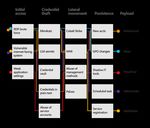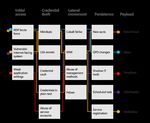Is the New Battleground - Cyber Signals - Microsoft News
←
→
Page content transcription
If your browser does not render page correctly, please read the page content below
Is the New Battleground
Identity is the new battleground, but most
83
are unprotected against attacks
Cyber Signals 22%
78%
Million attacks 22% of Azure Active
Directory with strong
11/26 to 12/31 commercial/ authentication
enterprise customers
78% of Azure Active
Directory without
strong authenticationDangerous
mismatch in scale
of identity-focused
attacks vs.
preparedness
Digital identity takes many forms. For most
of us, it’s the email address and different
passwords we use to access apps and services
online. This is the currency threat actors use
to penetrate networks, steal credentials, and
impersonate employees and consumers in the
digital world.
We are All Cybersecurity Defenders
Cyber Signals 1Endpoint threats:
Microsoft Defender for Endpoint blocked
more than 9.6 billion malware threats
targeting enterprise and consumer
customer devices, between January and
December 2021.
E-mail threats:
Microsoft Defender for Office 365
blocked more than 35.7 billion phishing
and other malicious e-mails targeting
enterprise and consumer customers,
between January and December 2021.
Identity threats:
Microsoft (Azure Active Directory)
detected and blocked more than
25.6 billion attempts to hijack enterprise
customer accounts by brute-forcing
stolen passwords, between January and
December 2021.
Methodology: For snapshot data
Microsoft platforms including Defender
and Azure Active Directory provided
anonymized data on threat activity, such
as brute force login attempts, phishing
and other malicious e-mails targeting
enterprises and consumers, and malware
attacks between January and December
2021. Additional insights are from the
24 trillion daily security signals gained
across Microsoft including the cloud,
endpoints, and the intelligent edge.
Strong authentication data combines
MFA and passwordless protection.
Cyber Signals 2Nation-state actors
redouble efforts to
simply grab identity
The need to enforce MFA adoption or go
passwordless cannot be overstated, because the
building blocks
simplicity and low cost of identity-focused attacks
make them convenient and effective for actors.
While MFA is not the only identity and access
management tool organizations should use, it can
Cyberattacks by nation-state actors are on provide a powerful deterrent to attacks.
the rise. Despite their vast resources, these
adversaries often rely on simple tactics Abusing credentials is a fixture of NOBELIUM, a
to steal easily guessed passwords. By so nation-state adversary linked to Russia. However,
doing, they can gain fast and easy access to other adversaries, such as Iran-linked DEV 0343
customer accounts. In the case of enterprise rely on password sprays too. Activity from
attacks, penetrating an organization’s DEV-0343 has been observed across defense
network allows nation-state actors to gain companies producing military-grade radars, drone
a foothold they can use to move either technology, satellite systems, and emergency
vertically, across similar users and resources, response communication systems. Further
or horizontally, gaining access to more activity has targeted regional ports of entry in
valuable credentials and resources. the Persian Gulf, and several maritime and cargo
transportation companies with a business focus in
Spear-phishing, social engineering attacks, the Middle East.
and large-scale password sprays are basic
nation-state actor tactics used to steal or Iran: Most targeted countries
guess passwords. Microsoft gains insight (July 2020-June 2021)
into attackers’ tradecraft and successes
by observing what tactics and techniques
they invest in and find success with. If
user credentials are poorly managed or
left vulnerable without crucial safeguards
like multi-factor authentication (MFA) and To see diagram
passwordless features, nation-states will keep at full size
using the same simple tactics. Click here
Recommendations Review, harden, and monitor all tenant
administrator accounts: Security teams should
Organizations should: thoroughly review all tenant administrator users or
accounts tied to delegated administrative privileges
Enable multi-factor authentication: By so doing, to verify the authenticity of users and activities. They
they mitigate the risk of passwords falling into the should then disable or remove any unused delegated
wrong hands. Even better, eliminate passwords administrative privileges.
altogether by using passwordless MFA.
Establish and enforce a security baseline to reduce
Audit account privileges: Privileged-access risk: Nation-states play the long game and have
accounts, if hijacked, become a powerful weapon the funding, will, and scale to develop new attack
attackers can use to gain greater access to strategies and techniques. Every network-hardening
networks and resources. Security teams should initiative delayed due to bandwidth or bureaucracy
audit access privileges frequently, using the works in their favor. Security teams should prioritize
principle of least-privilege granted to enable implementing zero-trust practices like MFA and
employees to get jobs done. passwordless upgrades. They can begin with
privileged accounts to gain protection quickly, then
expand in incremental and continuous phases.
Cyber Signals 3Ransomware dominates
mindshare, but only a
few strains dominate
The dominant narrative seems to be that there
are massive numbers of novel ransomware threats
outstripping defenders’ capabilities. However,
Microsoft analysis shows this is incorrect. There’s
also a perception that certain ransomware groups
are a single monolithic entity, which is also
incorrect. What exists is a cyber-criminal economy
where different players in commoditized attack
chains make deliberate choices. They are driven by
an economic model to maximize profit based on
how they each exploit the information they have
access to. The graphic below shows how different
groups profit from various cyberattack strategies
and information from data breaches.
To see diagram at full size Click here
Average prices of cybercrime services for sale
That said, no matter how much ransomware is
out there, or what strains are involved, it really
comes down to three primary entrance vectors:
remote desktop protocol (RDP) brute force,
vulnerable internet-facing systems, and phishing.
All of these vectors can be mitigated with proper
password protection, identity management, and
software updates in addition to a comprehensive
security and compliance toolset. A type of
ransomware can only become prolific when it
gains access to credentials and the ability to
spread. From there, even if it is a known strain, it
To see diagram at full size Click here
can do a lot of damage.
Recommendations sync-and-share, but data copies are different from entire
IT systems and databases. Teams should visualize and
Security teams should: practice what full restorations look like.
Understand that ransomware thrives on default Manage alerts and move fast on mitigation: While
or compromised credentials: As a result, security everyone fears ransomware attacks, security teams’
teams should accelerate safeguards like implementing primary focus should be on strengthening weak security
passwordless or MFA on all user accounts and prioritizing configurations that allow the attack to succeed. They
executive, administrator and other privileged roles. should manage security configurations so alerts and
detections are being responded to properly.
Identify how to spot telltale anomalies in time to
act: Early logins, file movement, and other behaviors The cybersecurity bell curve:
that introduce ransomware can seem nondescript. Basic security hygeine still
Nonetheless, teams need to monitor for anomalies and protects against 98% attacks
act on them swiftly.
Have a ransomware response plan and conduct
recovery exercises: We live in the era of cloud
To see diagram at full size Click here
Cyber Signals 4Christopher Glyer: The point is to place a higher security premium
on identity, which in turn lets you tighten access
Principal Threat Intelligence privileges linked to those stronger authentications,
Lead at MSTIC minimizing the risk of an unauthorized login
having unchecked consequences, Glyer explains.
As Principal Threat Intelligence Lead with a focus
on ransomware at the Microsoft Threat Intelligence “Attackers are always raising the bar,” Glyer adds.
Center (MSTIC), Christopher Glyer is part of the “Fortunately, there are a lot of tools organizations
team that investigates how the most advanced can leverage as they conduct tabletop or red team
threat actors access and exploit systems. For the exercises that may reveal gaps or limitations in
inaugural edition of Cyber Signals, he shares his their identity and other security controls.”
thoughts on identity and security.
Glyer says a focus on finding weaknesses in
The shift to the cloud makes identity one of the identity is a common attack tactic shared by many
core components organizations must prioritize threat actors, cybercriminals, and nation-state
when implementing proactive security protections. actors, alike.
Identity is also an early focus area in any security
investigation related to possible intrusions. “If you look at a more macro trend over time,
nation-states are going to leverage cyberattacks
“When an attacker gains access to someone’s for espionage more frequently,” he explains.
identity and then reuses that identity to access
applications and data, organizations need to “I think you’re going to see the number of players
understand exactly how that identity was accessed, involved leveraging these capabilities continue to
what applications were touched, and what was rise, because the intelligence gains are potentially
done within those applications,” Glyer explains. quite large, versus the cost of executing these
“From a protection perspective, the number one attacks. Having secure identity protections,
thing you must do is prevent an identity from being whether it’s MFA, passwordless, and other
stolen, abused, or misused. Preventing this from defenses like conditional access policies, minimize
happening in the first place is critical.” that opportunity and make it much harder to raise
the attack bar. Securing those identities is key.”
“
Leading with identity-focused solutions including
enforcing multifactor authentication (MFA),
adopting passwordless solutions, and creating From a protection perspective, the
conditional access policies for all users dramatically number one thing you must do is
improves protection for devices and data,
particularly as hybrid work continues to create aim to prevent an identity from
scenarios where remote access, user roles, and being stolen, abused, or misused.
physical locations vary. These solutions help
”
organizations better control access to business- Preventing this from happening in
critical information and identify potentially the first place is critical.
anomalous activity.
Principal Threat Intelligence Lead at MSTIC
Christopher Glyer
Cyber Signals 5Iran: Most targeted countries Human-operated ransomware payloads
(July 2020-June 2021)
Click here to return to Threat Briefing page Click here to return to Defending Attacks page
Average prices of The cybersecurity bell curve:
cybercrime services for sale Basic security hygiene still protects
against 98% of attacks
Click here to return to Defending Attacks page Click here to return to Defending Attacks page
© 2022 Microsoft Corporation. All rights reserved. Cyber Signals is for informational purposes only. MICROSOFT
MAKES NO WARRANTIES, EXPRESS, IMPLIED OR STATUTORY, AS TO THE INFORMATION IN THIS DOCUMENT.
This document is provided “as is.” Information and views expressed in this document, including URL and other
Internet website references, may change without notice. You bear the risk of using it. This document does not
provide you with any legal rights to any intellectual property in any Microsoft product.You can also read



























































